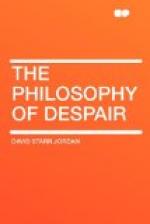To this in turn comes a feeling of reaction. The joys of life have been a thousand times felt before they come to us. We are but following part of a cut-and-dried program, “performing actions and reciting speeches made up for us centuries before we were born.” The new power of manhood and womanhood which seemed so wonderful find their close limitations. As our own part in the Universe seems to shrink as we take our place in it, so does the Universe itself seem to grow small, hard and unsympathetic. Very few young men or young women of strength and feeling fail to pass through a period of Pessimism. With some it is merely an affectation caught from the cheap literature of decadence. It then may find expression in imitation, as a few years ago the sad-hearted youth turned down his collar in sympathy with the “conspicuous loneliness” that took the starch out of the collar of Byron. “The youth,” says Zangwill, says bitter things about Life which Life would have winced to hear had it been alive.” With others Pessimism has deeper roots and finds its expression in the poetry or philosophy of real despair.
This adolescent Pessimism cannot be wrought into action. The mood disappears when real action is demanded. The Pessimism of youth vanishes with the coming of life. Through the rush of the new century, the fad of the drooping spirit has already given way to the fad of the strenuous life. Equally unreasoning it may be, but far more wholesome.
But if action is impossible, the mood remains. And here arises the despair of the highly educated. The purpose of knowledge is action. But to refuse action is to secure time for the acquisition of more knowledge. It is written in the very structure of the brain that each impression of the senses must bring with it the impulse to act. To resist this impulse is in turn to destroy it and to substitute a dull soul-ache in its place. “Much study is a weariness of the flesh, and the experience of all the ages brings only despair if it cannot be wrought into life. This lack of balance between knowledge and achievement is the main element in a form of ineffectiveness which with various others has been uncritically called Degeneration. As the common pleasures which arise from active life become impossible or distasteful, the desire for more intense and novel joys comes in, and with the goading of the thirst for these comes ever deeper discouragement.
At the best, the tendency of large knowledge, not vitalized by practical experience, is to spend itself in cynical criticism, in futile efforts to tear down without feeling the higher obligation to build up. For it is the essence of this form of Pessimism to feel that there is nothing on earth worth the trouble of building. The real is only a “sneering comment” on the ideal, and man’s life is too short to make any action worth while.
“With her the seed of Wisdom did I sow,
And with mine own hands wrought to make it grow;
And this is all the harvest that I reap’d,
‘I come like water, and like wind I go.’”




